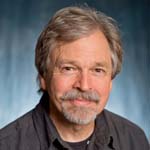 University of Washington
University of Washington
Principal Investigator
dastahl@u.washington.edu
(206) 685-3464
David Stahl works on evolutionary and ecological origins of community assembly, stability, and efficiency informed by model microbial mutualism in co-cultures anchors many of our ongoing ENIGMA projects. He collaborates closely with the team across the 3 aims. His primary activities are in the assembly, modeling, and evolution of simple microbial communities simulating environmental systems and associated processes. These activities contribute to the general ENIGMA goal of developing foundational knowledge necessary for predicting and modulating the activities of natural microbial communities in reactors that simulate environmental conditions.
He will isolate and characterize field-relevant bacteria and archaea for developing laboratory models of field processes, including the design and construction of synthetic microbial communities for detailed kinetic, genetic, and isotopic characterization. Laboratory work will be complemented by field studies using abundance and isotopic composition of nitrogen species to identify significant nitrogen transformations operative at field scale. In coordination with field researchers, combined isotopic, molecular, and nitrogen speciation data will be used to help parameterize reactive transport models.
Relevant Publications
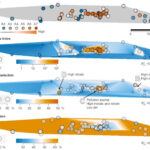 Nuclear Waste Sites Yield Microbial Ecosystem Insights - In a flagship seven-year study, published this January in the journal Nature Microbiology, ENIGMA researchers explored how environmental stresses influence the composition and structure of microbial communities in the groundwater of the Oak Ridge Reservation (ORR), a former nuclear waste disposal site. More →
Nuclear Waste Sites Yield Microbial Ecosystem Insights - In a flagship seven-year study, published this January in the journal Nature Microbiology, ENIGMA researchers explored how environmental stresses influence the composition and structure of microbial communities in the groundwater of the Oak Ridge Reservation (ORR), a former nuclear waste disposal site. More →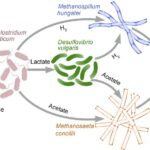 To Study Competition and Cross-Feeding, Scientists Build Synthetic Microbiomes - A new study investigated complex interactions among four cross-feeding microorganisms in a synthetic community (SynCom) that converts cellulose to methane and carbon dioxide, paving the way toward a more predictive understanding of the impact of environmental perturbations on microbial interactions sustaining geochemically significant processes in natural systems. More →
To Study Competition and Cross-Feeding, Scientists Build Synthetic Microbiomes - A new study investigated complex interactions among four cross-feeding microorganisms in a synthetic community (SynCom) that converts cellulose to methane and carbon dioxide, paving the way toward a more predictive understanding of the impact of environmental perturbations on microbial interactions sustaining geochemically significant processes in natural systems. More → Examining adaptations of a dominant bacterial species at a contaminated subsurface site - Leveraging comparative genomics, community analysis, and geochemical data to understand adaptations that facilitate survival of a dominant community member in the contaminated Oak Ridge Reservation subsurface. More →
Examining adaptations of a dominant bacterial species at a contaminated subsurface site - Leveraging comparative genomics, community analysis, and geochemical data to understand adaptations that facilitate survival of a dominant community member in the contaminated Oak Ridge Reservation subsurface. More →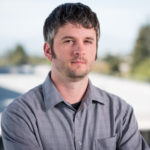 Using microcalorimetry and thermodynamic modeling to examine effects of thermal stress - Hunt KA, von Netzer F, Gorman-Lewis D, Stahl DA. (2022) Microbial maintenance energy quantified and modeled with microcalorimetry. Biotechnol Bioeng. 2022 Jun 9; [DOI]:10.1002/bit.28155. {PMID}: 35680566 OSTI:1874049 All known biology is driven by the partitioning of energy released from nutrient consumption, either into building new cells or maintaining cellular integrity required for viability. The energy invested in maintaining viable cellular… More →
Using microcalorimetry and thermodynamic modeling to examine effects of thermal stress - Hunt KA, von Netzer F, Gorman-Lewis D, Stahl DA. (2022) Microbial maintenance energy quantified and modeled with microcalorimetry. Biotechnol Bioeng. 2022 Jun 9; [DOI]:10.1002/bit.28155. {PMID}: 35680566 OSTI:1874049 All known biology is driven by the partitioning of energy released from nutrient consumption, either into building new cells or maintaining cellular integrity required for viability. The energy invested in maintaining viable cellular… More →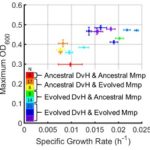 Automating Culturing Technology Aids In Scaling Bacterial Growth Experiments - An automated multiplexed turbidometric and data collection system for measuring growth kinetics of anaerobes dependent on gaseous substrates Hunt, KA; J Forbes, F Taub, N Elliott, J Hardwicke, R Petersen, N Stopnisek, DAC Beck, DA Stahl; Journal of Microbiological Methods, [DOI]:10.1016/j.mimet.2021.106294 For decades, the cloudiness (turbidity) of a culture has been used to monitor the growth of microbes. Some microbes… More →
Automating Culturing Technology Aids In Scaling Bacterial Growth Experiments - An automated multiplexed turbidometric and data collection system for measuring growth kinetics of anaerobes dependent on gaseous substrates Hunt, KA; J Forbes, F Taub, N Elliott, J Hardwicke, R Petersen, N Stopnisek, DAC Beck, DA Stahl; Journal of Microbiological Methods, [DOI]:10.1016/j.mimet.2021.106294 For decades, the cloudiness (turbidity) of a culture has been used to monitor the growth of microbes. Some microbes… More → Anne Otwell Receives AAAS Science and Technology Policy Fellowship - Dr Anne Otwell receives a prestigious Science and Technology Policy Fellowship through the American Association for the Advancement of Science. Congratulations Annie! Currently in David Stahl's lab, working on understanding the biotic and abiotic factors controlling denitrification activity, including the production and consumption of the greenhouse gas nitrous oxide. We had a chance to catch up with her before she heads… More →
Anne Otwell Receives AAAS Science and Technology Policy Fellowship - Dr Anne Otwell receives a prestigious Science and Technology Policy Fellowship through the American Association for the Advancement of Science. Congratulations Annie! Currently in David Stahl's lab, working on understanding the biotic and abiotic factors controlling denitrification activity, including the production and consumption of the greenhouse gas nitrous oxide. We had a chance to catch up with her before she heads… More →